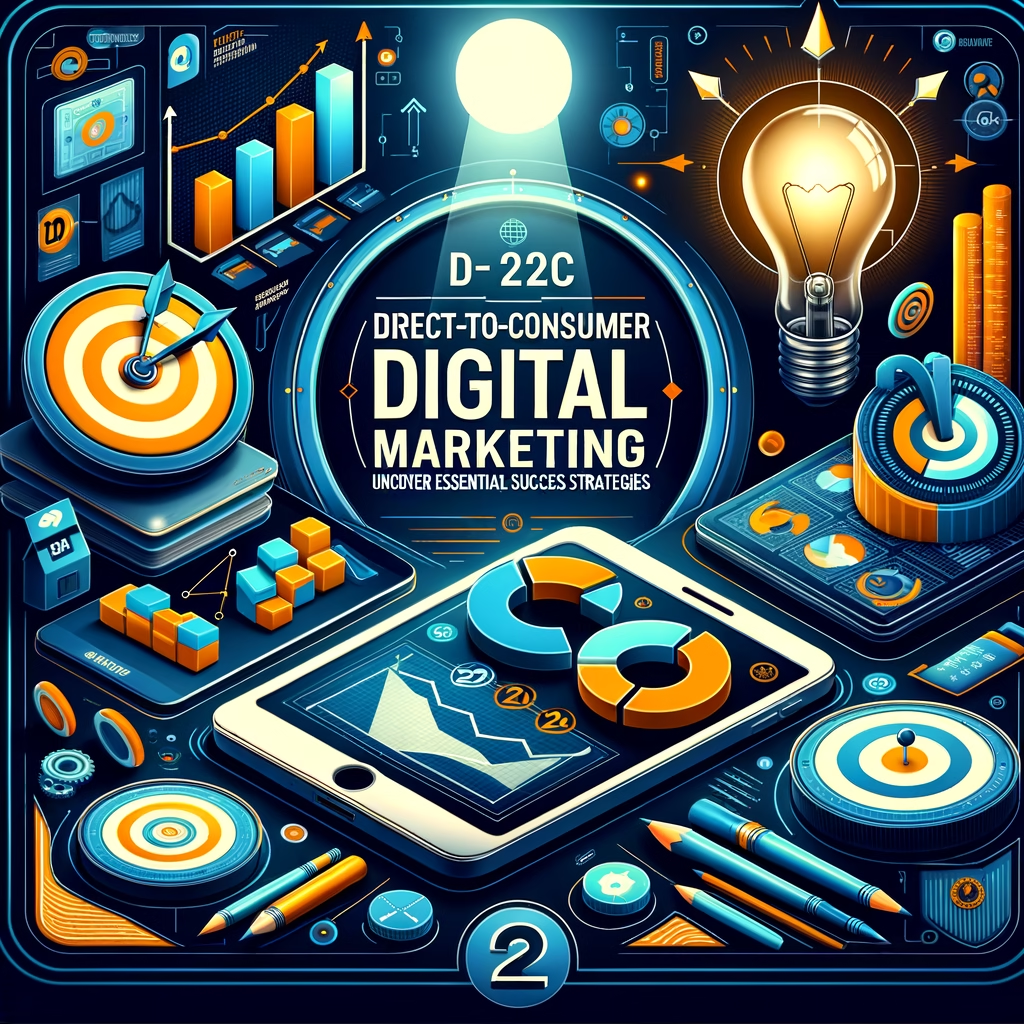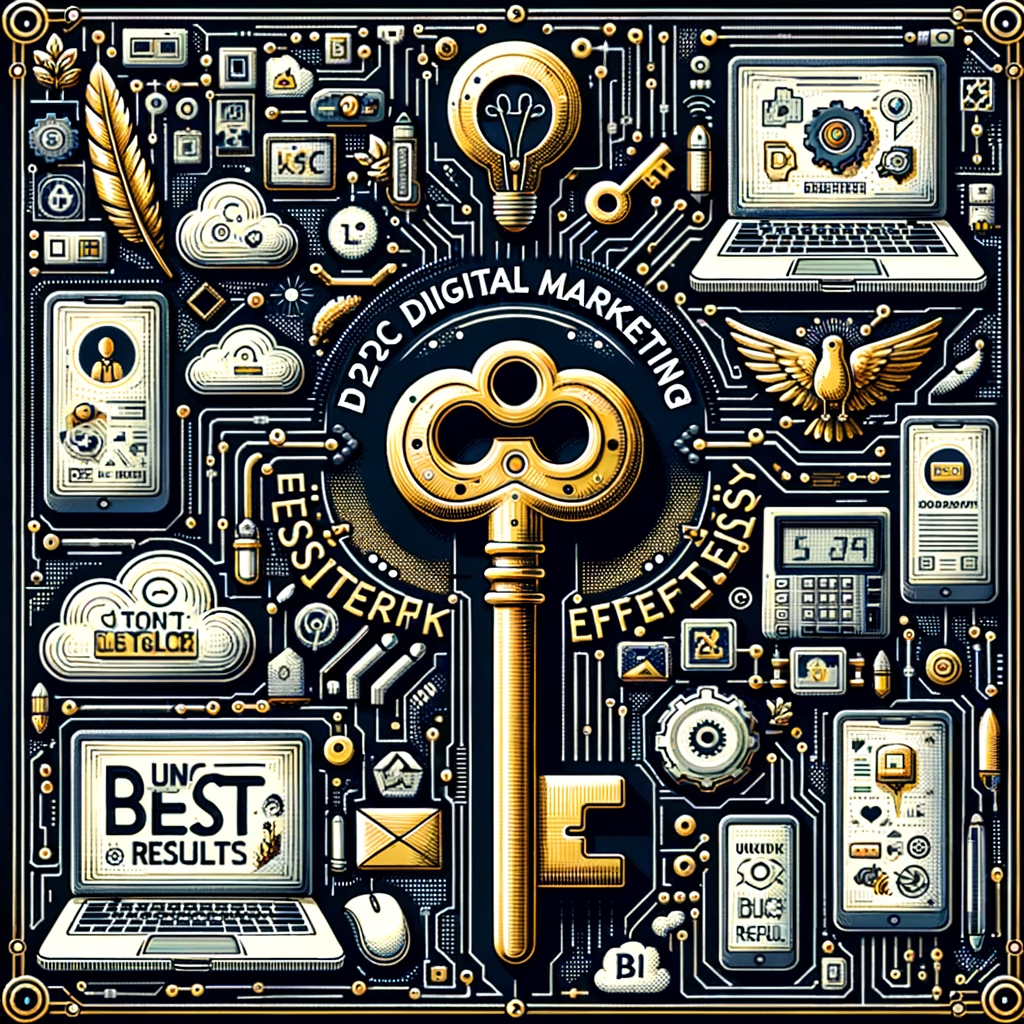- D2C Digital Marketing: Unleashing Success Through Innovative Strategies
- Introduction
- The Rise of D2C Brands
- Innovative Strategies for D2C Success
- Leveraging Social Media for Brand Awareness
- User-Generated Content (UGC)
- Influencer Collaborations
- Selecting the Right Influencers
- Optimizing for Mobile Commerce
- Mobile-Friendly Design
- Utilizing Mobile Apps
- Harnessing the Power of Data-Driven Marketing
- Personalized Marketing Campaigns
- Emphasizing Customer Experience
- Customer Feedback Loops
- Implementing AI and Automation
- Chatbots and Customer Interaction
- Marketing Automation
- Trends Shaping the Future of D2C Marketing
- Sustainability and Ethics
- Augmented Reality (AR)
- Conclusion
D2C Digital Marketing: Unleashing Success Through Innovative Strategies

Introduction
D2C digital marketing has transformed the landscape for brands looking to connect directly with consumers. By eliminating intermediaries, direct-to-consumer (D2C) brands can control every aspect of their business, from manufacturing to distribution and customer interaction. In this article, we explore innovative strategies that help D2C brands achieve remarkable success in the digital domain.
The Rise of D2C Brands
In recent years, we’ve witnessed the rise of D2C brands in various sectors, from fashion and beauty to technology and home goods. This model allows brands to create personalized customer experiences, gather valuable consumer data, and foster strong brand loyalty.
Innovative Strategies for D2C Success
To thrive in the competitive D2C landscape, brands must adopt innovative strategies tailored to modern digital marketing methods. Below, we’ll dive into some of these approaches that can unlock success for D2C brands.
Leveraging Social Media for Brand Awareness
Social media platforms are paramount for D2C brands aiming to build brand awareness and engage with their target audience. By creating compelling and authentic content, brands can quickly reach and resonate with consumers. Platforms like Instagram, TikTok, and Facebook offer unique opportunities for brands to showcase their personalities and products vividly.
User-Generated Content (UGC)
Encouraging customers to share their experiences and product usage on social media platforms is a powerful way to build trust and authenticity. UGC offers social proof, showing potential customers the genuine satisfaction of existing users. Brands can incentivize this by creating branded hashtags, running contests, or featuring customer photos on their own channels.
Influencer Collaborations
Collaborating with influencers aligns directly with the D2C model’s emphasis on direct, personalized engagement. By partnering with influencers who embody the brand’s ethos, D2C companies can reach new, engaged audiences. These collaborations often involve content creation, special promotions, and even product development, which further enhances the brand’s reach.
Selecting the Right Influencers
Choosing the right influencers is crucial. Brands should focus on authenticity and alignment with brand values rather than follower count alone. Micro-influencers, with their more engaged and niche audiences, often provide higher ROI than larger influencers.
Optimizing for Mobile Commerce
With the majority of online shopping now occurring on mobile devices, creating a seamless mobile shopping experience is essential for any D2C brand.
Mobile-Friendly Design
A responsive website design that ensures smooth navigation and quick loading times on mobile devices will significantly impact purchase decisions. Features such as easy checkout processes, stored payment information, and intuitive navigation are vital components.
Utilizing Mobile Apps
Developing a mobile app can further enhance user experience by offering personalized recommendations, loyalty programs, and exclusive offers. Apps also provide a platform for push notifications, which keep customers engaged with timely updates and promotions.
Harnessing the Power of Data-Driven Marketing
Data is an invaluable asset for D2C brands, enabling them to understand consumer preferences and behaviors better. By leveraging data analytics, brands can refine their marketing strategies to improve ROI and customer engagement.
Personalized Marketing Campaigns
Utilizing data to craft highly personalized marketing campaigns allows brands to engage consumers authentically. By sending targeted emails, personalized product recommendations, and tailored content, brands can elevate customer experiences significantly.
Emphasizing Customer Experience
Customer experience is at the heart of D2C success. Brands that prioritize and enhance their customer interactions consistently outperform those that do not.
Customer Feedback Loops
Establishing feedback loops with customers aids in understanding their needs and addressing concerns effectively. This can be through surveys, reviews, or direct communication channels like chat support. Constructive feedback helps refine products, services, and the overall customer journey.
Implementing AI and Automation
Artificial intelligence and automation streamline processes and enhance decision-making, making them invaluable tools for D2C brands.
Chatbots and Customer Interaction
AI-powered chatbots provide 24/7 customer service, addressing common inquiries and resolving issues in real-time. This level of service ensures that customers feel valued and heard, potentially leading to increased brand loyalty.
Marketing Automation
Automation in email marketing, retargeting ads, and customer segmentation allow brands to maintain consistent communication with customers without overwhelming resources. Automation tools help optimize marketing efforts and enhance the customer journey.
Trends Shaping the Future of D2C Marketing
The D2C model continues to evolve, influenced by emerging technologies and changing consumer behaviors. Brands must stay ahead of these trends to remain competitive.
Sustainability and Ethics
Consumers are increasingly demanding transparency, sustainability, and ethical practices from brands. D2C companies that prioritize these elements and communicate them effectively can resonate deeply with their audience.
Augmented Reality (AR)
AR technology allows consumers to virtually try on products, from clothing to home decor. This immersive shopping experience enhances customer confidence and reduces return rates.
Conclusion
In summary, D2C digital marketing offers immense potential for brands aiming to connect closely with consumers. By adopting forward-thinking strategies — from leveraging social media and influencer collaborations to embracing mobile commerce and AI — brands can unlock substantial success. As the landscape continues to shift, D2C brands that embrace innovation and prioritize customer experience will not only survive but thrive in this dynamic market.



